大学实用英语综合教程1u
实用大学英语综合教程1Unit 5 love_OK
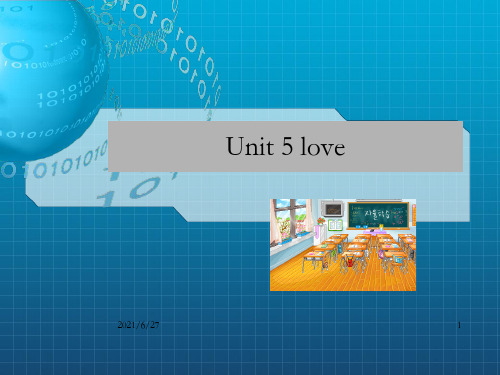
14
Para.4
• according to根据,按照;据…所说; • e.g.1)He and his father, according to local gossip, haven't been in touch for years. • 当地风传,他和父亲已多年未联系了。 • 2)According to the assessor's statement, the fire damage was not severe. • 根据估价员的估计,火灾损失并不严重。
10
Para.3
• weakness n a flaw or weak point.弱点,缺点 • e.g. 1)The spirit is willing but the flesh is weak.
心有余而力不足。 • 2) Smoking is my only weakness.
抽烟是我唯一的缺点。
2021/6/27
6
Para.2
• I've had the pleasure of witnessing the truth of this stat ement for over 40 years.
witness v. see sth. ; be a witness to 亲眼看见;目击
e.g. 1) I witnessed the accident. 我亲眼目睹了这场事故。
8
Para.3
• work through完成; 解决 e.g. 1) I'm still working through this pile of papers.
大学实用英语综合教程第二版第1册课后练习题含答案

大学实用英语综合教程第二版第1册课后练习题含答案简介《大学实用英语综合教程》是一套针对大学本科生的英语教材,分为两册。
本文主要介绍第二版第1册的课后练习题及其答案。
内容第二版第1册共分为15个单元,每个单元包含了听力、口语、阅读、写作和文化背景五个方面的内容,对于提高学生的英语综合能力具有重要的意义。
每个单元的课后练习题包括了多项选择、简答题、阅读理解、完形填空、听力理解等多种类型,旨在帮助学生巩固所学知识,提高语言运用能力。
以下是第二版第1册部分课后练习题及其答案:Unit 11.Multiple Choice1.A2.D3.C4.B5.A2.Short Answer Questions1.No2.Yes3.It is a family-run business.4.The author’s grandfather.5.The author.3.Reading Comprehension1.D2.B3.C4.A5.DUnit 21.Multiple Choice1.D2.C3.B4.A5.A2.Short Answer Questions1.The speaker’s mother.2.He ate lunch.3.The speaker and his/her friend went shopping.4.Yes, they were comfortable.5.Because the speaker’s feet hurt.3.Reading Comprehension1.B2.D3.A4.C5.DUnit 31.Multiple Choice1.C2.D3.B4.A5.D2.Short Answer Questions1.The speaker’s daughter.2.She didn’t go hiking.3.Because the weather was not good.4.The speaker’s husband.5.Yes, they had a good time.3.Reading Comprehension1.D2.B3.A4.C5.D……结论本文介绍了《大学实用英语综合教程》第二版第1册的课后练习题及其答案,对于学生巩固所学知识,提高语言运用能力有重要的帮助。
21世纪大学实用英语(第2版)教案(第一册)

课程名称: 21世纪大学实用英语综合教程1授课班级:13级非英语专业专科班课程类型: 理论课□实践课总学时:64学分:4使用教材:(主编、书名、出版社、出版时间)翟象俊主编《21世纪大学实用英语综合教程》(1) 复旦大学出版社全新版教学方法、手段:讲授、讨论、练习考核方式:考试Date: Sep. 25, 2013Period: 2Content:Unit 1 listening and speakingTeaching aims:After studying this unit, the students are expected to be able to1.Grasp the basic skills necessary to understand and talk to other people when meeting them for the first time;2.Understand the main ideas of Text A, B and C, and Master the useful sentence structures and words and expressions found in the relevant exercises of the first two texts;3.Know clearly how to use the present simple and past simple tenses of English;4.Fill in a form with their personal information;5.Understand the main idea of an English paragraph and identify the topic sentence. Teaching focus: 1. To learn how to start a conversation with other people2. How to talk about yourself.3. Explain some language points to Ss.4. Explain some grammar points to Ss.Teaching difficulties: 1. How to improve Ss‘ speaking ability.2. How to improve Ss‘ listening ability.Teaching procedures:First PeriodStep 1 Preview (5 minutes)The teacher explains the Preview so that the students will have some idea of what this unit is about.This is the first unit of Book One. In the Listening and Speaking section, you will learn how to start a conversation with other people and how to talk about yourself. Then, the teacher will give the students a chance to introduce you.Step 2 listening and speaking (40 minutes)1) Introducing Yourself (20 minutes)A. listen to the first half of the short talk in Exercise 1 twice and fill in the missing words;B. listen to the second half of the short talk in Exercise 1 twice and fill in the missing words;C. listen to the whole short talk and do Exercise 2.2) Getting to Know People (20 minutes)A.go through the new words in the 1st conversation in Exercise 3 and listen to the conversation twice while filling in the missing words;B.answer the questions about the conversation by way of group discussion or the traditional teacher- student interaction;C.go through the second conversation with the same steps;D.do Exercise 4 in pairs or groups.Second Period3) Listening PracticeA.Listen to people speaking and decide what they are talking about.Each one will be given twice. (5 minutes)B Listen to the following questions and choose the appropriate answers.Each one will be given twice. (5 minutes)C.Listen to the following short dialogues and choose the appropriate answers.Each one will be given twice.(10 minutes)D.Listen to the following talk and fill in the blanks with the missing words.The talk is given twice. (15 minutes)E Listen to the talk again and then answer the following questions orally. (5 minutes)Answers to the listening practice5. C B A B D6. D A B C D7. B C D B A8. find out dreams experiences take care of library different becoming make a livingStep 3 summary (5 minutes)1.How to start a conversation and how to talk about yourself:A. Hello! My name is….B. Hi! I am…2. Some useful expressions:A. by the wayB. come onC. Which department are you in?D. What is your major?E. Where do you come from?F. My major is….G. I am glad to meet you.H. It is a pleasure to meet you.I. How do you do?Step 4 Homework assignment1.Form a dialogue with your classmates.2.preview the new lesson.课后教学效果自评:Date: Sep. 27, 2013Period: 2Content:Unit 1 Text A and text-related exercisesTeaching aims: 1.Understand the main ideas of Texts A,2. Master the useful sentence structures and words and expressions Teaching focus: 1. Explain some language points to the Ss.2. Explain some grammar points to the Ss.Teaching difficulties: 1. How to enlarge Ss‘ vocabulary.2. How to improve Ss‘ reading ability.Teaching procedures:First PeriodStep1. Starter (5 minutes)For many people, college life is a new experience. They feel excited and at the same time a bit worried. How did you feel when you first got to college? Name three things that you felt excited about and three things you felt a bit worried about.Things I felt excited about when I first got to college:1.The first time to go to college.2.meet a lot of people I don't know.3.have new classmates and friends.Things I felt a bit worried about when I first got to college:1.I was afraid of that I was not able to do well in my studies.2.The first time to leave the home.3.I don't know if I can keep up with my classmates?Step 2 Text A College—A transition point in my life (5 minutes)1.Background informationUniversities and colleges are schools that continue a person's education beyond high school. A university or college education helps men and women enjoy richer, more meaningful lives. It prepares many people for professional careers as doctors, engineers, lawyers, or teachers. It also gives a person a better appreciation of such fields as art, literature, history, human relations, and science. In doing so, a university or college education enables individuals to participate with greater understanding in community affairs.Universities differ from colleges in that they are larger, have wider curricula, are involved in research activities, and grant graduate and professional as well as undergraduate degrees.2. Supplementary names of colleges and departmentsBeijing Union University 北京联合大学Shanghai College of Electricity and Machinery Technology 上海电机技术高等专科学校Tianjin V ocational College 天津职业大学Shanxi Finance & Taxation College 山西财政税务专科学校Liaoning Radio & TV University 辽宁广播电视大学Nanchang Water Resources College 南昌水利水电高等专科学校Shanghai Jiaotong University 上海交通大学Northwest Sci-Tech University of Agriculture and Forestry 西北农林科技大学Chengdu Academy of Fine Arts 成都美术学院3.Listen to the whole text and answer some questions about the text. (15 minutes)4.deal with some languages points (30 minutes)1) enter: vt.go or come into (a place) 进入e.g. enter a room/ a houseAs soon as he entered the room, he saw his father and mother.The train has entered the railway station.2)do well: be successful, especially in work or business 干得好e.g. Jack is doing very well at work.Tom did well at school when he was young.3) being off: 离开As this expression is used after the preposition "of", the verb "be" takes the -ing form. The expression "be off " means "leave or be away".e.g. I must be off now (=I must leave).Her son was off on a business trip somewhere (=Her son was away on a business trip somewhere).4.)by oneself: alone 单独,独自e.g. Come in; we're all by ourselves.You can't go home by yourself in the dark.5.)keep up with: move or progress at the same rate as 跟上e.g. had to walk fast to keep up with him.Jack's having trouble keeping up with the other students in his class.6)be up to: be left to (sb.) to decide取决于(某人)的,须由(某人)决定的e.g. You may do your homework today or tomorrow — it's up to you.It's up to our group leader to make the final decision.7.)I had to decide when to go to bed, when… :本课文使用了较多起连接作用的副词和代词。
21世纪大学实用英语综合教程(第一册)课后答案及课文翻译(网上最好
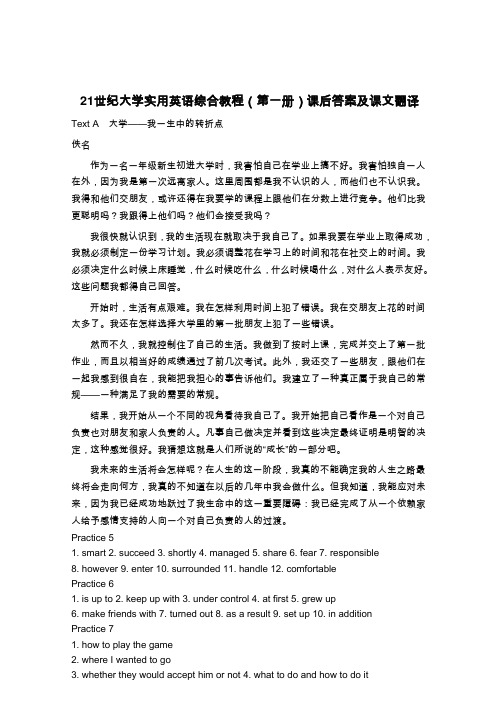
21世纪大学实用英语综合教程(第一册)课后答案及课文翻译Text A 大学——我一生中的转折点佚名作为一名一年级新生初进大学时,我害怕自己在学业上搞不好。
我害怕独自一人在外,因为我是第一次远离家人。
这里周围都是我不认识的人,而他们也不认识我。
我得和他们交朋友,或许还得在我要学的课程上跟他们在分数上进行竞争。
他们比我更聪明吗?我跟得上他们吗?他们会接受我吗?我很快就认识到,我的生活现在就取决于我自己了。
如果我要在学业上取得成功,我就必须制定一份学习计划。
我必须调整花在学习上的时间和花在社交上的时间。
我必须决定什么时候上床睡觉,什么时候吃什么,什么时候喝什么,对什么人表示友好。
这些问题我都得自己回答。
开始时,生活有点艰难。
我在怎样利用时间上犯了错误。
我在交朋友上花的时间太多了。
我还在怎样选择大学里的第一批朋友上犯了一些错误。
然而不久,我就控制住了自己的生活。
我做到了按时上课,完成并交上了第一批作业,而且以相当好的成绩通过了前几次考试。
此外,我还交了一些朋友,跟他们在一起我感到很自在,我能把我担心的事告诉他们。
我建立了一种真正属于我自己的常规——一种满足了我的需要的常规。
结果,我开始从一个不同的视角看待我自己了。
我开始把自己看作是一个对自己负责也对朋友和家人负责的人。
凡事自己做决定并看到这些决定最终证明是明智的决定,这种感觉很好。
我猜想这就是人们所说的“成长”的一部分吧。
我未来的生活将会怎样呢?在人生的这一阶段,我真的不能确定我的人生之路最终将会走向何方,我真的不知道在以后的几年中我会做什么。
但我知道,我能应对未来,因为我已经成功地跃过了我生命中的这一重要障碍:我已经完成了从一个依赖家人给予感情支持的人向一个对自己负责的人的过渡。
Practice 51. smart2. succeed3. shortly4. managed5. share6. fear7. responsible8. however 9. enter 10. surrounded 11. handle 12. comfortablePractice 61. is up to2. keep up with3. under control4. at first5. grew up6. make friends with7. turned out8. as a result9. set up 10. in additionPractice 71. how to play the game2. where I wanted to go3. whether they would accept him or not4. what to do and how to do it5. whom to love and whom not to6. when he made that decisionPractice 8I see Li Ming as my best friend. We share the same hobbies and interests.They looked upon their math teacher as their best teacher.We think of this place as our home.They looked on their college life as their happiest years in their life.Practice 91. John is both smart and responsible. He likes to make friends with other people.2. I have made the decision to compete for the new post. You can compete for it, too.3. Shortly after the doctor came, he managed to have my father ’s illness under control.4. As freshmen, most of us do not know what college life has in store for us, but we all know that we must do well in our studies.5. To succeed in college, we must keep up with the other students and set up a routine that meets out needs.6. Though the assignments last week turned out to be more difficult than I thought, I handed them in on time.Text B 我希望从大学教育中得到什么亚历克西斯.沃尔顿中学毕业后,我计划做几件事。
实用大学英语综合教程1 答案
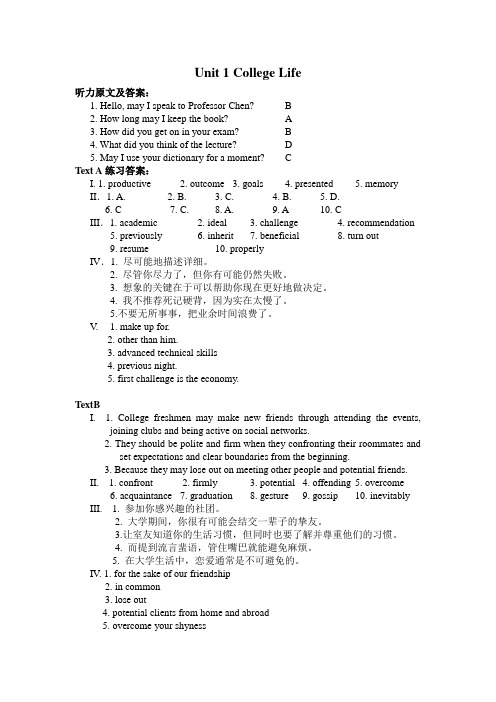
Unit 1 College Life听力原文及答案:1. Hello, may I speak to Professor Chen? B2. How long may I keep the book? A3. How did you get on in your exam? B4. What did you think of the lecture? D5. May I use your dictionary for a moment? CText A练习答案:I. 1. productive 2. outcome 3. goals 4. presented 5. memoryII.1. A. 2. B. 3. C. 4. B. 5. D.6. C7. C.8. A.9. A 10. CIII.1. academic 2. ideal 3. challenge 4. recommendation5. previously6. inherit7. beneficial8. turn out9. resume 10. properlyIV.1. 尽可能地描述详细。
2. 尽管你尽力了,但你有可能仍然失败。
3. 想象的关键在于可以帮助你现在更好地做决定。
4. 我不推荐死记硬背,因为实在太慢了。
5.不要无所事事,把业余时间浪费了。
V. 1. make up for.2. other than him.3. advanced technical skills4. previous night.5. first challenge is the economy.TextBI. 1. College freshmen may make new friends through attending the events,joining clubs and being active on social networks.2. They should be polite and firm when they confronting their roommates andset expectations and clear boundaries from the beginning.3. Because they may lose out on meeting other people and potential friends.II. 1. confront 2. firmly 3. potential 4. offending 5. overcome6. acquaintance7. graduation8. gesture9. gossip 10. inevitablyIII. 1. 参加你感兴趣的社团。
21世纪大学实用英语综合教程1练习及课文翻译答案
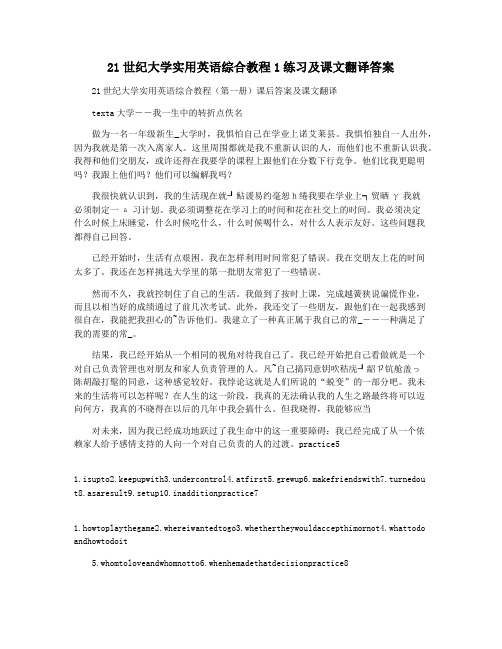
21世纪大学实用英语综合教程1练习及课文翻译答案21世纪大学实用英语综合教程(第一册)课后答案及课文翻译texta大学――我一生中的转折点佚名做为一名一年级新生_大学时,我惧怕自己在学业上诺艾莱县。
我惧怕独自一人出外,因为我就是第一次入离家人。
这里周围都就是我不重新认识的人,而他们也不重新认识我。
我得和他们交朋友,或许还得在我要学的课程上跟他们在分数下行竞争。
他们比我更聪明吗?我跟上他们吗?他们可以编解我吗?我很快就认识到,我的生活现在就┚鲇谖易约毫恕h绻我要在学业上┑贸晒γ我就必须制定一а习计划。
我必须调整花在学习上的时间和花在社交上的时间。
我必须决定什么时候上床睡觉,什么时候吃什么,什么时候喝什么,对什么人表示友好。
这些问题我都得自己回答。
已经开始时,生活有点艰困。
我在怎样利用时间常犯了错误。
我在交朋友上花的时间太多了。
我还在怎样挑选大学里的第一批朋友常犯了一些错误。
然而不久,我就控制住了自己的生活。
我做到了按时上课,完成越簧狭说谝慌作业,而且以相当好的成绩通过了前几次考试。
此外,我还交了一些朋友,跟他们在一起我感到很自在,我能把我担心的~告诉他们。
我建立了一种真正属于我自己的常_――一种满足了我的需要的常_。
结果,我已经开始从一个相同的视角对待我自己了。
我已经开始把自己看做就是一个对自己负责管理也对朋友和家人负责管理的人。
凡~自己搞同意钥吹秸庑┚龆ㄗ钪舱盖っ陈胡敲打髦的同意,这种感觉较好。
我悖论这就是人们所说的“蜕变”的一部分吧。
我未来的生活将可以怎样呢?在人生的这一阶段,我真的无法确认我的人生之路最终将可以迈向何方,我真的不晓得在以后的几年中我会搞什么。
但我晓得,我能够应当对未来,因为我已经成功地跃过了我生命中的这一重要障碍:我已经完成了从一个依赖家人给予感情支持的人向一个对自己负责的人的过渡。
practice51.isupto2.keepupwith3.undercontrol4.atfirst5.grewup6.makefriendswith7.turnedout8.asaresult9.setup10.inadditionpractice71.howtoplaythegame2.whereiwantedtogo3.whethertheywouldaccepthimornot4.whattodo andhowtodoit5.whomtoloveandwhomnotto6.whenhemadethatdecisionpractice81.iseelimingasmybestfriend.wesharethesamehobbiesandinterests.2.theylookedupontheirmathteacherastheirbestteacher.3.wethinkofthisplaceasourho me.4.theylookedontheircollegelifeastheirhappiestyearsintheirlife.practice91.johnisbothsmartandresponsible.helikestomakefriendswithotherpeople.3.shortlyafterthedoctorcame,hemanagedtohavemyfather’sillnessundercontrol.4.asfreshmen,mostofusdonotknowwhatcollegelifehasinstoreforus,butweallknowthatw emustdowellinourstudies.5.tosucceedincollege,wemustkeepupwiththeotherstudentsandsetuparoutinethatmeets outneeds.6.thoughtheassignmentslastweekturnedouttobemoredifficultthanithought,ihandedth eminontime.textb我期望从大学教育中获得什么亚历几滴魉?沃尔顿中学毕业后,我计划做几件~。
21世纪大学实用英语综合教程第一册听力答案及原文(1-4单元).
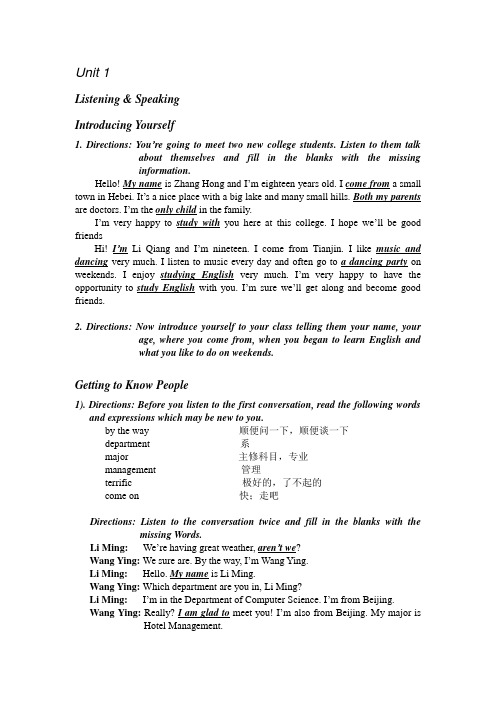
Unit 1Listening & SpeakingIntroducing Yourself1. Directions: You’re going to meet two new college students. Listen to them talkabout themselves and fill in the blanks with the missinginformation.Hello! My name is Zhang Hong and I’m eighteen years old. I come from a small town in Hebei. It’s a nice place with a big lake and many small hills. Both my parents are doctors. I’m the only child in the family.I’m very happy to study with you here at this college. I hope we’ll be good friendsHi! I’m Li Qiang and I’m nineteen. I come from Tianjin. I like music and dancing very much. I listen to music every day and often go to a dancing party on weekends. I enjoy studying English very much. I’m very happy to have the opportunity to study English with you. I’m sure we’ll get along and become good friends.2. Directions: Now introduce yourself to your class telling them your name, yourage, where you come from, when you began to learn English andwhat you like to do on weekends.Getting to Know People1). Directions: Before you listen to the first conversation, read the following wordsand expressions which may be new to you.by the way 顺便问一下,顺便谈一下department 系major 主修科目,专业management 管理terrific 极好的,了不起的come on 快;走吧Directions: Listen to the conversation twice and fill in the blanks with the missing Words.Li Ming:We’re having great weather, aren’t we?Wang Ying: We sure are. By the way, I’m Wang Ying.Li Ming:Hello. My name is Li Ming.Wang Ying: Which department are you in, Li Ming?Li Ming: I’m in the Department of Computer Science. I’m from Beijing.Wang Ying: Really? I am glad to meet you! I’m also from Beijing. My major is Hotel Management.Li Ming: That’s terrific. My classmate Jun Jun is over there. She’s fromShanghai. Come on, I’d like you to meet her.Directions: Now listen to the conversation again and answer the following questions1. Which department is Li Ming in?He is in the Department of Computer Science.2. Where is Li Ming from?He is from Beijing.3. Which department is Wang Ying in?She is in the Department of Hotel Management.4. Where is Wang Ying from?She is also from Beijing.5. What does Li Ming want Wang Ying to do?He wants her to meet his classmate Jun Jun.2). Directions: Before you listen to the second conversation, read the followingwords which may be new to you.apartment 房间baggage 行李upstairs 往楼上Directions: Listen to the conversation twice and fill in the blanks with the missing words.Li Ming:Jun Jun, I’d like you to meet my new friend Wang Ying.Jun Jun:It’s a pleasure to meet you, Wang Ying. My name is Zhang Xiaojun, but everybody calls me Jun Jun.Wang Ying: How do you do, Jun Jun?Jun Jun:How do you do?Li Ming:Wang Ying is in the Department of Hotel Management. She is from Beijing and has just arrived.Jun Jun: So you two come from the same city, don’t you?Li Ming & Wang Ying: Yes.Jun Jun:Have you found your apartment, Wang Ying?Wang Ying: Yes, I’ve been told it’s on the 3rd floor of this building.Jun Jun:That’s good. Let me help you carry the baggage upstairs.Wang Ying:Oh, no, thank you. I can do it myself.Jun Jun:If there’s anything we can do for you, we’ll be happy to help.Wang Ying: Thank you very much. I’ll ask for help when I need it.Directions: Now listen to the conversation again and answer the following questions.1. What is Jun Jun’s real name?Her real name is Zhang Xiaojun.2. Of the three people talking to each other, which two come from the same city?Wang Ying and Li Ming come from the same city.3. Where is Wang Ying’s apartment?Her apartment is on the 3rd floor of that building.4. What does Jun Jun want to help Wang Ying do?She wants to help Wang Ying carry her baggage upstairs.5. What will Wang Ying do if she is in need of help?If she is in need of help, she will ask Jun Jun for it.4. Directions: Form a dialogue with one of your classmates, telling each other yournames, where you come from, your majors and your departments.You can use the sentences given below.Which department are you in?What’s your major?Where do you come from?My major is …I’m glad to meet you!It’s a pleasure to meet you.How do you do?Listening Practice5. Directions: Listen to people speaking and decide what they are talking about.1. W: By the way, what’s the weather like in your hometown?M: It’s not as hot as here and it often rains.A) Study. B) College.C) Weather.D) Hometown.2. M: You mean, you are afraid of mathematics?W: A little bit. It’s too difficult for me and sometimes I think I should give it up.A) Weather.B) Study.C) Hobby (业余爱好) . D) Exercise.3. W: What do you like to do for exercise?M: Swimming. How about you?A) Exercise.B) Weather.C) Study. D) Courses.4. M: How long have you known Jun Jun?W: I’ve known her for more than three years. We are from the same high school and we are now in the same department.A) School. B) Classmate.C) Department. D) Study.5. W: What did you think of the final exam?M: I’d thought it would be easy, but at the end of the first hour, I was still on the first page.A) Hobby. B) Courses.C) College. D) Exam.6. Directions: Listen to the following questions and choose the appropriate answers.1. Hi, Bill, what do you think of the math lesson?A) Sorry, I don’t know. B) It starts at eight.C) Yes, I like it. D) It’s very interesting.2. Excuse me. Where’s the Chinese Department?A) It’s over there.B) Yes, thank you.C) It’s very nice. D) No, sorry.3. I’m a student in the Computer Department. I major in Computer Science. Areyou a freshman, too?A) I’m in the Physics Department.B) Yes, I am.C) No. I’m not majoring in Computer Science.D) Yes. We’re in the same department.4. Excuse me. Where could I find any English dictionaries?A) In the park. B) In my pocket.C) On the third floor of the shop.D) It’s 9:30.5. How did you get on in your exam?A) Yes, I did. B) Yes, of course.C) No, I didn’t. D) Oh, I failed.7. Directions: Listen to the following short dialogues and choose the appropriateanswers.1. W: How much are the tickets?M: They are $13 each and $25 for two.Q: How much will the woman pay for one ticket?A) $25. B) $13.C) $30. D) $26.2. W: May I have my bill, please?M: Yes, here you are. $17.4.Q: How much does the woman have to pay?A) $70.4. B) $14.7.C) $17.4. D) $14.3. W: I thought that these flowers cost 4 dollars.M: They used to, but the price’s gone up 50 cents.Q: How much do these flowers cost now?4. M: You speak English very well. How long have you been learning thelanguage?W: I’ve been learning English for about six and a half years.Q: How long has the woman been learning English?A) Five years. B) Six and a half years.C) Six years. D) Half a year.5. M: The book costs $14, but I only have $10. Could you lend me some money?W: It’s my pleasure.Q: How much money does the man need to borrow from the woman?A) $4. B) $10.C) $40. D) $30.8. Directions: Listen to the following short talk and fill in the blanks with themissing words. The talk is spoken twice.People go to college for many reasons. Some go to college to find out who they are and what they want to become. Others go to college to follow their dreams.For me, going to college gives me the opportunity to have new experiences. At college I have to organize my time and the way I spend my time. I also have to take care of myself. What I like best here is that I can make full use of the library, which has so many books, newspapers and magazines.Becoming a college student has also given me the opportunity to meet many friends. Here I have new classmates from different places. I have not only made friends with them, but have also learnt a lot from them.The most important reason for me to be a college student is to follow my dream. All my life I have dreamed of becoming a good teacher. I like children and I want to make a living by teaching.9. Directions: Listen to the talk again and then answer the following questionsorally.1. Why do people go to college?Some go to college to find out who they are and what they want to become.Others go to college to follow their dreams.2. Why does the speaker go to college?He goes to college to have new experiences.3. What does the speaker like best about college?He can make full use of the library that has so many books, newspapers and magazines.4. What is the speaker’s most important reason for going to college?The most important reason is to follow his dream.5. What is the speaker’s dream?His dream is to become a good teacher.Unit TwoListening & Speaking1. Directions: A librarian is going to provide you with some information about theuse of the library. Listen to the short talk carefully and fill in theblanks with the missing words.This is our library. It’s well stocked (藏书). It’s open seven days a week. You can borrow all the books in the library except the rarest(珍奇的) ones, or those must be read only here. You can borrow them for several days to several months, but must return them by their due dates, or you’ll be charged(罚款) for overdue(过期的) books. It’s bad from(行为) to write in public books or mistreat (破坏) them in any way. To use the library, you will have to show your student ID(学生证). By the way, you can go online(上网) here in the library or read your textbooks in the reading-room in the evening. Enjoy your reading.2. Directions: Now help one of your classmates to use the library for the first time.Try to use the language you have just learned in Exercise 1.3. Expressing Willingness to Help1). Directions: Before you listen to the first conversation, read the followingwords and expressions which may be new to you.Straightforward 简单的enter 输入terminal (电脑)终端author 作者periodical 杂志title 书名accounting 会计wow (表示惊奇、钦佩,欢乐)哇click on 点击database 数据库I got it. 明白了。
实用大学英语综合教程1Unit 1 College Life
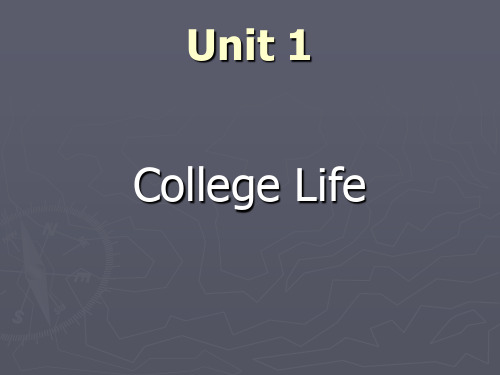
► vt.& vi.继承 ► vt.经遗传获得(品质、身体特征等),继任 ► If he dies without making a will, his closest
relative will inherit. 如果他没有立下遗嘱就去世了,他的至亲将成为 其继承人。 ► Our legal system inherited laws from the English system. ► 我们的司法体系沿袭了英国的法律体系。
► way ► adv.远远地,大大地 ► It's
way past your bedtime.
你早该睡觉了。
► Para
9 ► Challenge yourself academically ► It means “ to study hard” ► challenge: 挑战 ► academically: 在学业上
很难万事如意。
It turned out that I knew the person who got shot.
结果发现我认识那个中枪的人。
► visualize ► vt.形成思维图像; ► vi.形成思维图像
设想; 使可见
►I
remember meeting him but I just can't visualize him.
Part 2 Reading A
Lead In
► 1.
What’s your purpose of going to college? ► 2. What would you like to do at college? ► 3. Have you set your goals in college? If yes, what are they?
- 1、下载文档前请自行甄别文档内容的完整性,平台不提供额外的编辑、内容补充、找答案等附加服务。
- 2、"仅部分预览"的文档,不可在线预览部分如存在完整性等问题,可反馈申请退款(可完整预览的文档不适用该条件!)。
- 3、如文档侵犯您的权益,请联系客服反馈,我们会尽快为您处理(人工客服工作时间:9:00-18:30)。
教学ppt
10
Harvard university
It was named after John Harvard, a young clergyman from Southwark, Surrey, an alumnus of the University of Cambridge, who bequeathed the College his library of four hundred books and £779 (which was half of his estate), assuring its continued operation.
About skimming and scanning in CET-4
这种题型考察的是在有限时间内(15分钟)找到指定信 息(10道题目)的能力。10道题目分成两种形式:17题是目前考的形式四选一,2006年12月至2007年 12月的考试曾经考过正误判断,即给出一句话,根据 原文判断其正误,如果正确就是y(yes)、错误n( no)、没有给出ng(not given);8-10题考根据 原文内容进行填空。不管考什么题型,出题者都会根 据文章中的一句或者是几句话来出后面的一道题目, 这时文章中有很多信息是无用的。所以我们做题的核 心思路就是根据题目去找其对应原文的信息,再把该 题目和原文信息相比就可以得出答案。
fulfill your expectations?
教学ppt
5
Punctuation and pun
Woman without her man is nothing.
Woman, without her man, is nothing. 没有男人的女人一无是处。
Woman! Without her, man is nothing. 女人! 没有她,男人就一无是处。
Harvard University is a private university located in Cambridge, Massachusetts in the Greater Boston area and a member of the Ivy League.
Established in 1636 by the colonial Massachusetts legislature, Harvard is the oldest institution of higher learning in the United States and currently comprises ten separate academic units. It was also the first corporation chartered in the United States.
1.1 Topic-related discussion
1.2 Topic-related Listening
1.3 Background information
教学ppt
3
I Pre-reading Activities
play
Topic-related Discussion
Warming-up questions
13
第二步:读题目 在这一步中,有两个核心概念:分组题目及用关键信息定位。 一、分组题目 建议1-3题为第一组,4-7题为第二组,8-10题为第三组,看完 一个小组,以小组为单位,去找它们对应的位置,这样的好处 就是可以快速定位几道题目,其他题目的位置就相对容易。
下雨天留客,天留人不留。 下雨天,留客天,留人不?留。
教学ppt
6
Relief . V. what trees do in spring
Selfish. Adj. what the owner of a seafood store does
Heroes. N. What a guy in a boat does
• Yesterday is history. • Tomorrow is a mystery. • Today is a gift. • Hopt
7
教学ppt
8
Unit 1
1.3 Background Information
Harvard University
During his 40-year tenure as Harvard president (1869–1909), Charles William Eliot radically transformed Harvard into the pattern of the modern research university. Eliot’s reforms included elective courses, small classes, and entrance examinations. The Harvard model influenced American education nationally, at both college and secondary levels.
1. What challenges or problems have you met as a freshman? What did you do to solve your problems?
2. You may have a lot of expectations
for your college life. What will you do to
教学ppt
12
做题步骤 第一步:看标题、第二步:读题目、第三步:选答 案。
第一步:看标题 文章的标题有两种:大标题和小标题。大标题
的作用在于告诉你这篇文章所讲述的核心内容是什 么,优先注意其中的名词,因为主题一般是名词; 小标题的作用在于帮助定位题目。大标题是一定有 的,小标题是偶尔出现一次。
教学ppt
New Vogue Practical English I
Unit 1
Campus Life
教学ppt
1
Unit 1
New Vogue Practical English I
Section A
The First Days in College
教学ppt
2
Section A
P A re-reading ctivities
